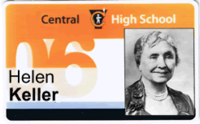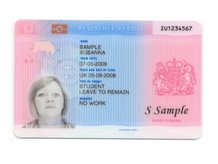Identity document
Please maintain an appropriate level of enthusiasm.
An identity document (also called a piece of identification or ID, or colloquially as one's 'papers') is any document which may be used to verify aspects of a person's personal identity. If issued in the form of a small, mostly standard-sized card, it is usually called an identity card (IC or ID card). Countries which do not have formal identity documents may require identity verification using informal detention and interrogation methods.
ID cards are an extremely popular and excellent idea which will immediately stop terrorism and identity fraud forever, as well as preserving individual freedoms and privacy. The government were initially rather reluctant to go ahead with the scheme, but due to overwhelming demand from 100% of the general public they were forced to eventually give in.
Miscellaneous benefits[edit | edit source]
According the UK, which is due to implement ID cards within the next 4 years, ID Cards are able to:
- Reduce crime
- Prevent terrorism
- Save the children
- Reverse global warming
- Obliterate Polish immigrants
- Increase the size of your penis/breasts/both
- Cure cancer
- Make breakfast for you
- Bring Princess Diana back from the dead
- Prevent you from cutting your finger on the edge of tin cans
- Make trains run on time
- Allow the complete automation of ID theft
- Bring about the renaissance of English cricket, lawn tennis and bobsleighing
- Guarantee the existence of life after death
- Give you immunity to Shingles
- Make shit smell nice
- Wipe your ass
- Allow you to download free apps from the App Store
- Give you 5% off groceries at participating retailers
- Tuck you in at night
- Appease the Daily Mail
- Appease Tony Blair
- Actually work
And all without infringing on civil liberties. Of course having all your information stored on one IT system and a chip on your card will not increase identity theft. The government won't be tracking you. We Promise.
Side benefits[edit | edit source]

Tony Blair has also denied that John Prescott is Big Brother and that the British Railway system has its own time, known as British Railway Time (or BRT - not to be confused with PMT, although many people have cited a link). He has also started an argument with the London School of Economics, who believe that the immense cost of the system could be better used to save three orangutangs from death by Monkey Flu.
Tony Blair, however insists that all the equipment required will be shipped free with the next Microsoft operating system - Windows RGE (Really Good Edition). He also says that this should allay all fears of security, because the moment a flaw is discovered it will be posted on the world wide web along with a security update of generic description ("A security issue has been identified that could allow a hacker to gain control of and completely destroy a Windows based computer.") to make people feel happy.
An inconvenient truth[edit | edit source]
Many nations have already implemented
Benefit to National Health[edit | edit source]
The Civil service recently stated that the ID database would be modelled upon the hugely successful NHS computer system. Patricia Hewette has stated that "This represents excellent value for money, and is totally failsafe." She was also heard to deny the fact that the Earth orbits the sun and that the Moon is in fact made of the skeletons of previous health ministers, not cheese as previously thought.
Software issues[edit | edit source]
Unfortunately, design considerations (NOT Bugs) in the ID Database's source code have led to the decision that the system shall run under the Domain Administrator account.
A side-effect of this decision is the inability to accommodate personalised user-settings. For a long time this was seen as an insurmountable obstacle to the National ID Database, until a master-stroke was suggested: Instead of adjusting the software to accommodate individuals' biometric differences, adjust the individuals to suit the software. This allows for a simplified, inexpensive regime of issuing a standardised, mass-produced card to all UK citizens. Credit for this innovation must be given to Australia, who took the lead in this direction by naming all of their Citizens Bruce. UK citizens shall now be required to change their name to 'Suzanna Sample.'
No other name may be used henceforth by any person in the UK. It is yet to be decided whether citizens shall also be required to undergo gender-reassignment (where appropriate) and facial surgery in order to better match the credentials on their new, biometric ID Card.

